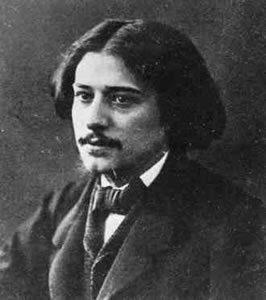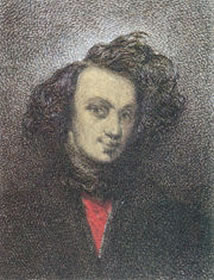De Duitse dichter en schrijver Wolfgang Hilbig werd geboren in Meuselwitz op 31 augustus 1941. Hilbig woonde en werkte jarenlang in Oost-Duitsland, alvorens hij zich in West-Duitsland vestigde. Tijdens zijn Oost-Duitse periode was hij in eerste instantie in verscheidene technische banen werkzaam, onder meer als stoker. Eind jaren zeventig gaf hij daar de brui aan en besloot zich geheel toe te leggen op het schrijven, in eerste instantie voornamelijk van gedichten. Uitgebracht werk in West-Duitsland deed hem een paar weken in voorarrest belanden en leverde hem een geldboete op omdat hij zich hiermee aan een deviezenmisdrijf zou hebben schuldig gemaakt. In 1985 wist hij een visum voor West-Duitsland te bemachtigen en verkaste naar dat land. In 1989 debuteerde Hilbig met zijn eerste roman, Eine Übertragung, die lovende kritieken ontving. In 1993 kwam Ich uit, een roman waarin vanuit het perspectief van een informant van de Stasi de laatste periode van de DDR wordt beschreven en waarmee hij de meeste bekendheid verwierf. Daarna verschenen nog een aantal andere werken, waaronder Das Provisorium (2000) dat autobiografisch is getint. Centraal in zijn boeken staat het dubbelleven als arbeider en schrijver in de DDR en de zoektocht naar individualiteit. Hij ontving tijdens zijn leven een heel scala aan prijzen, waaronder op het laatst – in 2002 – ook de gerenommeerde Georg-Büchner-Preis, de hoogste literatuurprijs van Duitsland. Wolfgang Hilbig overleed op 2 juni jongstleden aan kanker.
Blätter und Schatten
icht neu kann sein was du beginnst –
denn immer nimmst du was dir längst gegeben
und gibst es hin:
wie in der Liebe da es mir gebricht
an jeder Kenntnis: rot wie die Buchen Laub verstreun
maßlos am Wegrand wo ich schon sehr frühe ging …
und kannte nicht den Weg
und kenn ihn jetzt noch nicht
und kenne nicht das Kind des Schatten mir vorausläuft
und weiß nichts von der Sonne die ihr rotes Gold
dem Blattwerk einbrennt.
Und weiß nicht mehr den Herbst
der ernst in meinem Rücken ging und dem ich Schatten
war: stets neu entworfner Schatten ungezählter Herbste.
Berlin. Sublunar
Die Zeit ist wieder eingekehrt in Berlin
und die Hochstapler defilieren in der Oranienburger Straße
um Mitternacht gen Himmel deutend: die Zeit
ist retour aus dem Exil.
Die ganze Stadt in den Fesseln silbergrauer Magie
der Vollmond rollt: und wir die Marionetten seines Lichts –
Unwirklichkeiten die uns glänzend informieren.
Wir und die Toten
über Schattengräben wandelnd
wir sprechen uns ein letztes Mal die Unsterblichkeit zu.
O dieser stark leuchtende Staub zwischen den Investruinen
und welcher April noch so kurz vor dem dritten Jahrtausend!
Wir wollen nicht mehr weiterzählen
die grünen Wasser in den alten Häusern brennen langsam ab.
L’île Méditérranée
Wenn Weißdorn ausbricht in der Nacht die mein
Erleuchten ist dann träum ich plötzlich dort zu sein
auf jener Insel: doch der Traum ist dein …
Auch mein Herz will die Insel deines Traums bewahren –
dein Traum in meinem Traum: wie eine Insel in der Nacht …
dein Tag in meiner Nacht … des Weißdorns Düfte sind erwacht
mit einem Mal …
und es ist Zeit für dich dorthin zu fahren
wo stärker noch die Düfte sind und helle Quellen im Gestein.
Ah diese Wasser rinnen auch durch meiner Träume Widerschein
und durch die Felsenmulden ziehn die Rinder der Korsaren.

Wolfgang Hilbig (31 augustus 1941 – 2 juni 2007)
De Engelse schrijfster Elizabeth von Arnim, nicht van Katherine Mansfield, werd op 31 augustus 1866 geboren in Kirribilli Point in de buurt van Sydney, Australië. Ze trouwde eerst met graaf von Arnim, met wie ze vijf kinderen had, en later met graaf Russell, broer van Bertrand. Haar eerste en meest succesvolle roman, Elizabeth en haar Duitse tuin (1898), is een sfeervol portret van de jaren die ze met haar eerste echtgenoot doorbracht op het landgoed van de familie in Pommeren. Daar creëerde en vereeuwigde ze de plek die haar zo na aan het hart stond – haar tuin.
Uit: Elizabeth and Her German Garden
“‘I enjoyed the winter immensely,’ I persisted when they were a little quieter; ‘I sleighed and skated, and then there were the children, and shelves and shelves full of—‘ I was going to say books, but stopped. Reading is an occupation for men; for women it is a reprehensible waste of time. And how could I talk to them of the happiness I felt when the sun shone on the snow, or of the deep delight of hoar-frost days?'”

Elizabeth von Arnim (31 augustus 1866 – 9 februari 1941)
De Amerikaanse schrijver William Saroyan werd geboren op 31 augustus 1908 in Fresno, Californië. Zie ook mijn blog van 31 augustus 2006.
Uit: Here Comes There Goes You Know Who
“I believed from the beginning of remembered experience that I was somebody with an incalculable potential for enlargement, somebody who both knew and could find out, upon whom demands could be made with the expectation of having them fulfilled.
I felt at the same time, and pretty much constantly, that I was nothing in relation to Enormity, the Unknown, and the Unknowable. I was too vulnerable, too lacking in power, a thing of subtle reality, liable to be blown away without a moment’s warning, a migrant with no meaning, no guide, no counsel, an entity in continuous transition, a growing thing whose stages of growth always went unnoticed, a fluid and flawed thing. Thus, there could be no extreme vanity in my recognition of myself, if in fact there could be any at all. I did frequently rejoice in the recognition, but I may have gotten that from some of the Protestant hyms I had heard, and knew, and had sung, such as Joy to the World. The simple fact was that if the song wasn’t about me, I couldn’t see how it could possibly be about anybody else, including the one I knew it was supposed to be about, and good luck to him, too.”

William Saroyan (31 augustus 1908 – 18 mei 1981)
De Franse dichter en schrijver Théophile Gautier werd op 31 augustus 1811 geboren in Tarbes (departement Hautes-Pyrénées). Zie ook mijn blog van 31 augustus 2006.
Adieux à la poésie
Allons, ange déchu, ferme ton aile rose ;
Ôte ta robe blanche et tes beaux rayons d’or ;
Il faut, du haut des cieux où tendait ton essor,
Filer comme une étoile, et tomber dans la prose.
Il faut que sur le sol ton pied d’oiseau se pose.
Marche au lieu de voler : il n’est pas temps encor ;
Renferme dans ton coeur l’harmonieux trésor ;
Que ta harpe un moment se détende et repose.
Ô pauvre enfant du ciel, tu chanterais en vain
Ils ne comprendraient pas ton langage divin ;
À tes plus doux accords leur oreille est fermée !
Mais, avant de partir, mon bel ange à l’oeil bleu,
Va trouver de ma part ma pâle bien-aimée,
Et pose sur son front un long baiser d’adieu !
Sérénade
Sur le balcon où tu te penches
Je veux monter… efforts perdus !
Il est trop haut, et tes mains blanches
N’atteignent pas
mes bras tendus.
Pour déjouer ta duègne avare,
Jette un collier, un ruban d’or ;
Ou des cordes de ta guitare
Tresse une échelle, ou bien encor…
Ôte tes fleurs, défais ton peigne,
Penche sur moi tes cheveux longs,
Torrent de jais dont le flot baigne
Ta jambe ronde et tes talons.
Aidé par cette échelle étrange,
Légèrement je gravirai,
Et jusqu’au ciel, sans être un ange,
Dans les parfums je monterai !

Théophile Gautier (31 augustus 1811 – 23 oktober 1872)


